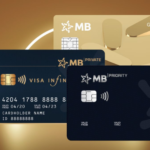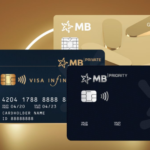If you’re unsure of the requirements and procedures for taking out a bank loan, your application may not meet the approval criteria. So, let’s explore the exact conditions and processes for applying for a bank loan.
1. Bank Loan Requirements
Borrower Eligibility
 A valid ID card (CMND/CCCD) is the first requirement for taking out a bank loan.
A valid ID card (CMND/CCCD) is the first requirement for taking out a bank loan.
Eligible borrowers include:
– Vietnamese citizens or foreigners residing in Vietnam with a valid ID card (CMND/CCCD) or passport.
– Individuals aged 18 years or older.
– The loan must be for legal purposes.
Ineligible borrowers include:
 Borrowers with bad debt may be rejected for a bank loan.
Borrowers with bad debt may be rejected for a bank loan.
– Members of the bank’s Board of Management, Supervisory Board, or senior management positions, such as General Director (Director), Deputy General Director (Deputy Director).
– Individuals seeking loans for investments or activities prohibited by law.
– Borrowers with bad debt or a low credit score may be rejected.
Income Requirements
 Stable income is a crucial factor in obtaining a bank loan.
Stable income is a crucial factor in obtaining a bank loan.
To apply for a bank loan, borrowers must demonstrate stable income. This can be done by providing an employment contract (still valid) along with original payroll statements from the last 3 to 6 months.
Based on your income, the bank will assess whether you can afford the loan amount you’re applying for. However, different banks may have additional requirements depending on their policies.
Collateral Requirements
 Collateral can include ownership of real estate.
Collateral can include ownership of real estate.
When applying for a bank loan, you may need to provide collateral in the form of assets, valuable documents, or property rights. This could be diamonds, jewelry, real estate ownership, bonds, stocks, etc.
2. Bank Loan Application Process
While the process may vary slightly between banks, here are the typical steps involved in applying for a bank loan:
Step 1 Prepare Your Application
 Bank staff will guide you through the application process and help you prepare the necessary documents.
Bank staff will guide you through the application process and help you prepare the necessary documents.
The first step is to prepare your application. The bank will ask you questions about your loan purpose, the amount you wish to borrow, and the desired loan term. They may also inquire about your monthly income sources and stability.
If you meet the eligibility criteria, the bank will guide you through the application process and help you gather the required documents.
Step 2 Submit and Assess Your Application
 The bank will receive your application and verify your information.
The bank will receive your application and verify your information.
Once your application is submitted, the bank will review your documents and verify your information. They will assess your eligibility and the specifics of your loan application.
The approval process may vary depending on the bank’s internal regulations and the completeness of the provided documents.
Step 3 Loan Approval
 The bank will continue with loan approval after assessing your application.
The bank will continue with loan approval after assessing your application.
If your application meets the bank’s criteria, the loan officer will prepare a credit proposal and send it to the authorized approver. If your loan is approved, the bank will notify you as soon as possible.
Step 4 Disbursement
 The final step is disbursement, which can be in cash or transferred to your account.
The final step is disbursement, which can be in cash or transferred to your account.
Once your loan is approved, you’ll need to sign a contract with the bank. After that, the disbursement process will begin. The bank will provide the agreed-upon loan amount, which you can receive in cash or via bank transfer.
Typically, the entire process takes 1 to 3 days, although it can take up to a week in some cases.
3. Documents Required for a Bank Loan
 Financial proof is crucial when applying for a bank loan.
Financial proof is crucial when applying for a bank loan.
When planning to take out a bank loan, it’s essential to have the following documents ready to ensure a smooth and quick process:
Loan application form (specific to the bank)
Legal documents:
– ID card (CMND/Hộ chiếu) of the borrower and their spouse.
– Household registration book (Hộ khẩu)/Temporary residence book (KT3).
– Certificate of single status/marriage certificate.
Financial documents:
– Proof of income from employment: Employment contract, work assignment decision, bank statements showing salary payments, or pay slips for the last 3 to 6 months.
– Proof of other income sources: Vehicle rental contracts, property sale contracts, etc., if applicable.
Loan purpose documents:
– Consumer loans: List of items to be purchased.
– Real estate purchase loans: Purchase contract/agreement, deposit receipt, etc.
– Home construction/renovation loans: Construction contract, budget estimate, etc.
Collateral documents (if applicable):
Property ownership documents, such as:
– Land use right certificate, house ownership certificate (pink book/red book), building permit, etc.
– Vehicle registration and insurance (for car collateral).
– Valuable documents like savings books, bonds, stocks, etc.
4. Choosing the Right Bank for Your Loan
 Understanding a bank’s interest rates is crucial before taking out a loan.
Understanding a bank’s interest rates is crucial before taking out a loan.
With the Vietnamese government’s support, citizens now have better access to bank loans, and interest rates have become more competitive. However, to mitigate risks, it’s essential to understand a bank’s interest rate policies and how they may change over time.
Here are the interest rates offered by some reputable banks:
– Vietcombank: 7.5%/year.
– Vietinbank: 7.7%/year.
– VPBank: 6.9 – 8.6%/year.
– ACB: 7.5 – 9.0%/year.
– Sacombank: 7.5 – 8.5%/year.
– Maritime Bank: 6.99%/year.
– Agribank: 7.6 – 9.1%/year.
The information provided above outlines the requirements, processes, and necessary documents for applying for a bank loan. Understanding these steps and preparing the required documents will ensure a smooth and efficient loan application process.
How to Apply for an MB Bank Credit Card: A Comprehensive Guide and Eligibility Requirements
Applying for an MB Bank credit card is now easier than ever, as long as you have a minimum monthly income of 5 million VND. This article provides the necessary requirements to open an MB Bank credit card along with detailed instructions on the application process. Follow along to learn more!
Documents for Obtaining a CCCD Chip-Enabled Card’>The Essential Documents for Obtaining a CCCD Chip-Enabled Card
“The buzz around CCCD chip implants is undeniable, and it’s time to unravel the mystery. As you embark on this futuristic journey, let’s ensure you have all the essential paperwork in order. Consider this your go-to guide, crafted with meticulous attention to detail, to navigate the CCCD chip implantation process with ease. Get ready to enhance your understanding and embark on this exciting path with confidence!”




































